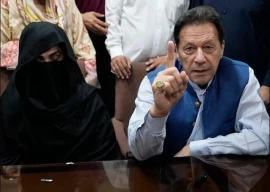The Persian-origin santoor is an instrument now on the verge of extinction. Few musicians in the subcontinent have managed to master the 72-string instrument and are left to strive for the survival of this instrument as well as their own.
Ustad Rahim Bakhsh, 75, recently retired from Radio Pakistan due to deteriorating health and now lives in a rented two marla house in Rawalpindi’s Westridge Bazaar with his wife, sons and grandsons. Despite practicing for over 50 years and cementing the country’s reputation with his talent through the range of international concerts and festivals he attended, the artist may soon be homeless.
Two months ago, the owner of the house served Bakhsh with an eviction notice when he failed to pay the rent on time. The notice was withdrawn when his family assured him that future payments would be timely, but Bakhsh says it was an uphill task to save money from his meagre pension.
On the suggestion of his wife, Bakhsh wrote a letter to Punjab Chief Minister Shahbaz Sharif to ask for assistance. “But there is no respite, even from the office of ‘Khadame-Alla’”, he maintained. Bakhsh told The Express Tribune that in recognition of his work, former Prime Minister Zulfiqar Ali Bhutto appointed him in Radio Pakistan back in 1976. He recalled that it was the only favour he had ever availed from any ruling govt in his life.
Bakhsh blames poor governance for the lack of concern shown for Pakistan’s artists and their suffering. “I didn’t ask Bhutto to appoint me to Radio Pakistan but he recognised my talent,” he said. Part of the blame for the ambivalence towards the santoor and its musicians is the Kashmir dispute between India and Pakistan. The instrument has traditionally been used as an accompanying instrument to Kashmiri folk music. The political strain has also prevented musicians from both countries from interacting. “Despite my earnest desire, I could not meet my long-time Indian friend Pandit Ship Kumar Sharma, another santoor master”, Bakhsh said. He has played many songs about Kashmir’s independence on the Santoor’s strings, out of which, “Meray watan tere jannat may ayan geh ik din” gained popular status. He also recorded many songs for Pakistan Television.
Maybe his honesty and dedication are to blame for his plight, or maybe his only fault was not being born into the elite classes of generals, judges and politicians, but the maestro, who has worked with renowned musicians Ustad Mubarik Ali, Ustad Fateh Ali Khan and Nusrat Fateh Ali Khan, Mehdi Hassan, Malka Phukraj, Ghulam Ali, Pervez Mehdi, Mehnaz and Shamim Bano, is now at the mercy of others.
Published in The Express Tribune, February 7th, 2012.
COMMENTS (1)
Comments are moderated and generally will be posted if they are on-topic and not abusive.
For more information, please see our Comments FAQ

















This is so saddening. Is there any way to help? Many people would be glad to help if bank details were provided.